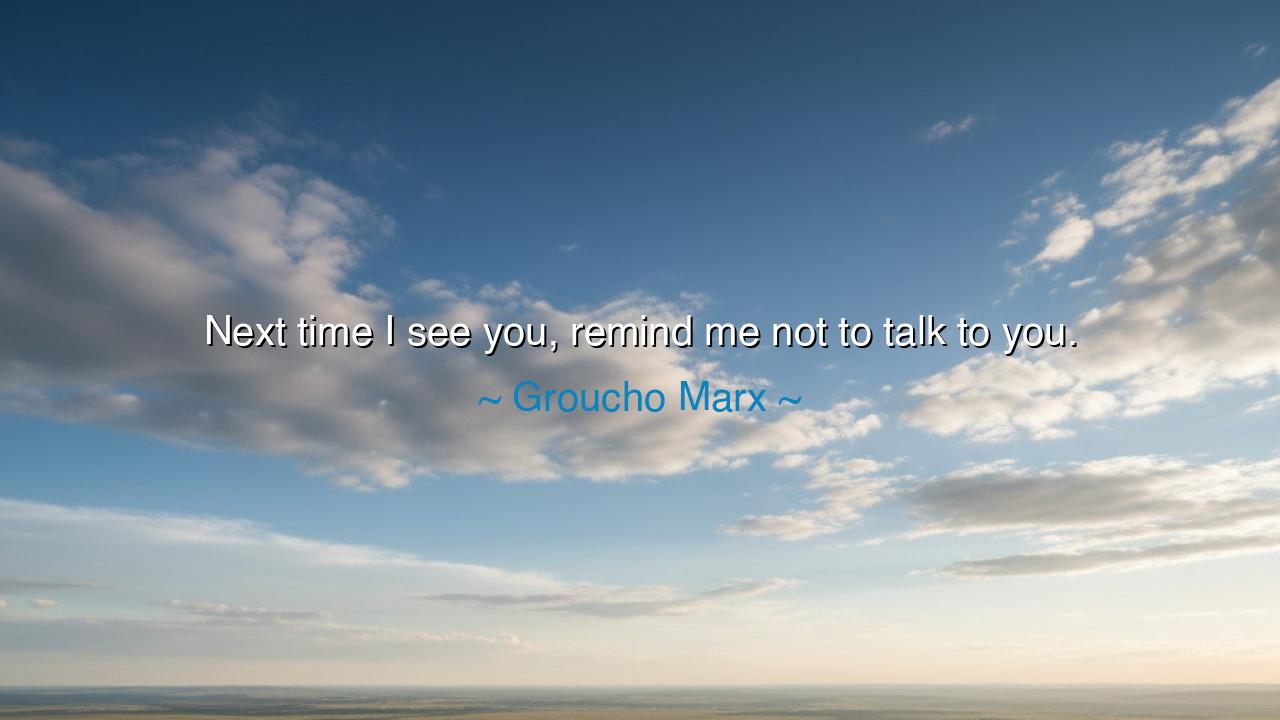
Next time I see you, remind me not to talk to you.






The words of Groucho Marx—“Next time I see you, remind me not to talk to you”—though framed in jest, carry within them the subtle wisdom of human interaction. Groucho, a master of wit and satire, clothed his insight in laughter, yet beneath the cloak of humor lies a lesson on boundaries, self-awareness, and the art of guarding one’s spirit. What seems at first to be nothing more than a clever insult is, in truth, a mirror reflecting how often we waste our breath and our peace on those who bring neither light nor growth to our lives.
This paradoxical statement is a reminder that sometimes the act of withdrawing is itself an act of wisdom. To say, “remind me not to talk to you,” is to confess both weakness and awareness—weakness because one is drawn back into unfruitful exchanges, awareness because one recognizes the harm of such encounters. In this way, the quote is not simply humorous; it is an admonition to guard our tongues, to choose carefully where we pour the energy of our words.
Consider the tale of Diogenes the Cynic, the philosopher who carried a lantern in daylight, searching for an honest man. When confronted by those who wasted his time with empty chatter, he did not hesitate to dismiss them with sharp and cutting humor. His wit, much like Groucho’s, was not cruelty but clarity—it stripped away pretense and revealed the futility of engaging endlessly with the shallow. The laughter provoked by such remarks was also a kind of teaching, forcing others to reflect on the weight and purpose of their speech.
In our own age, where voices clamor and noise surrounds us on every side, the lesson of Groucho’s jest becomes ever more urgent. How often do we find ourselves in conversations that drain us, arguments that lead nowhere, or company that diminishes rather than uplifts? To recognize this is not bitterness, but discernment. To step back is not arrogance, but wisdom. Thus, even a joke becomes a sword of truth, cutting through the fog of empty words.
Yet Groucho’s line also reminds us of the delicate balance between humor and truth. For laughter itself is a shield, allowing difficult truths to be spoken without bitterness. Many a hard reality is softened by jest, and many a deep wound is healed by shared laughter. Groucho, in his playful cruelty, teaches us that one may correct, resist, or withdraw without losing the gift of joy. His sharp wit reminds us that boundaries can be set with both firmness and levity.
To the seekers of wisdom: learn this. Your words are precious coins. Do not spend them in markets where they are trampled and undervalued. Save them for those who will treasure them, for those who will give back wisdom, compassion, or joy. And when you must withdraw from fruitless talk, let it be done with grace—whether through silence or, like Groucho, through the sharp relief of humor.
The practical action is clear: be mindful of whom you engage with. Notice how your spirit feels after conversation—are you uplifted, or are you drained? Practice silence when needed, and wield humor as a gentle weapon when directness may wound too deeply. Above all, remember that to protect your energy is not selfishness but stewardship, for your words, once spent, cannot be reclaimed.
Thus, let the teaching of Groucho Marx endure: wit may hide wisdom, and jest may cloak truth. Behind the laughter lies a command for discernment. Not all talk is worth your breath, not all company is worth your presence. Guard your words, protect your peace, and when needed, smile as you step away. For sometimes the highest wisdom is knowing when not to speak.






AAdministratorAdministrator
Welcome, honored guests. Please leave a comment, we will respond soon